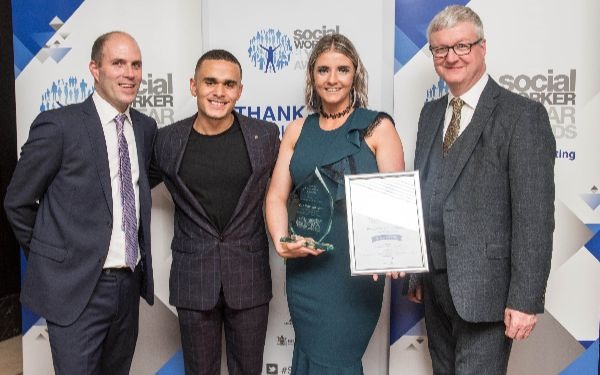
“A lot of people I talk to are surprised that I work in mental health as they see it as quite frightening, dealing with people who are in crisis… but I’ve never felt worried working within this area.”
Zoe Williamson is not one to shirk a challenge. Five years into her social work career, Williamson, who was named overall Social Worker of the Year in 2018, has tested herself in a number of different roles across the North East, stretching across both children’s and adults’ services.
She has recently taken up a management position within the NHS trust where she spent time working as a mental health social worker, supporting a team of seven practitioners who hold complex cases.
On the night of the awards, judges commended Williamson for her “care, compassion and positive focus”, recognising the “positive impact” she has had on those living with mental illness in her community.
The importance of ‘being there’
The judges’ assessment comes across clearly if you ask Williamson about her approach towards social work.
“I think it’s just about finding the time for people and being there”, she says. “If it’s six o’clock at night and you’re still working away, it’s about picking up the phone to people and having that 30-minute conversation with them.
“It can be hard, because we’ve got families to go home to, we’ve got our own lives, but you have to put your all into social work; you have to make yourself available to talk to those people in crisis and who are really struggling,” Williamson adds.
Graduating from university in 2013, Williamson worked within an integrated team at Northumberland County Council that covered a number of areas, including child protection and looked-after children.
She says three years spent working within children’s services massively boosted her confidence and prepared her for a career in social work.
Read about the results of this year’s SWotY awards:
“My experience rocketed because children’s services are very fast-paced, and it can be challenging at times, and really stressful.
“But I think the experience I gained within that role has helped set me up to become what I am now, and enabled me to progress and develop into the social worker that won the award.”
Feeling she had gained experience, Williamson decided she wanted to add strings to her bow and made the decision to move across to adults’ services in 2016.
“I wanted to get an idea of what different services were like, get an idea across the board, so in the future I would have a choice [when deciding where I wanted to work]”, she says.
‘A taboo subject’
Williamson says hearing more about mental health via news coverage, and seeing people writing about their mental health experiences on social media, prompted her to apply for a job in a hospital team, supporting patient discharge.
She had also learnt more about mental health social work while working in the hospital.
“I think mental health used to be a bit of a taboo subject in some services,” she says.
“I’d come across it, but I hadn’t had a huge experience of mental health and it was an area I had never known about or been able to access or work in, so it was exciting to look to challenge myself in that area.”
After working in mental health services for the last two years, Williamson’s commitment to facilitating positive changes in people’s lives is apparent.
“Enabling people to get out of hospital and thrive in the community, and to not be worried about being out in the community… it’s about seeing people being able to live their lives fully,” she says, adding that this encourages her to keep pushing on and progressing with her own work.
Getting on people’s level
Williamson recalls one particularly challenging case that involved supporting a young adult who was suicidal.
They had been admitted to psychiatric care on several occasions and posed a significant management problem to inpatient services in terms of keeping themselves safe.
Having worked with similar-aged people in her time as a children’s social worker, Williamson had the confidence and experience “to get on [the person’s] level” and build a strong relationship.
She also recognised that, as a young adult, the service user may not have wanted a social worker, or could have been embarrassed or even “ashamed” about having one. This made it even more important to reach out to the individual.
“[The person knew] they could pick the phone up and say, ‘I’m really struggling, and I don’t know how to get over it’, and having a chat, going for a coffee, or talking about what they were going through and what they were experiencing and supporting them [really helped her].”
Williamson adds that the person has since told her they would not known where they would be today without her intervention and support.
‘Without services, it can be hard’
The financial climate councils operate in has of course only added to the challenges social workers face and how they interact with other teams.
She says finding suitable housing for patients who have been discharged from hospital has been a problem in the past, but new systems have recently been put in place to address this.
“We sometimes go through different stages of experiencing difficulties in fixing people’s issues and it can be hard to do that,” Williamson says.
Read more about Mental Health social work:
“Sometimes you have to be the bearer of bad news and tell people they don’t meet the criteria, and that can be really difficult.”
Operating in this environment, Williamson says there is little option but to use your initiative.
“It’s [drawing on] what is available and the connections you have made within the local area,” she says. “We’re lucky, with the multidisciplinary teams we have in our area, we can pick up the phone and ask them if they can think of anything and whether there is anything they can support with.”
On some occasions, Williamson acknowledges, no solution exists. But, she adds, this is part and parcel of being a social worker.
“You can go home feeling anxious and very worried about what might happen, but as long as you know you’ve done your best, then there’s nothing else you can do,” she says. “That’s a really hard part of social work that you have to get your head around.”
Supporting staff to progress
Continuing to challenge herself, Williamson recently finished her approved mental health professional (AMHP) training.
One of her key responsibilities involves making applications for the detention of individuals in hospital, ensuring the Mental Health Act and its code of practice are followed.
Despite stepping into management and taking on new responsibilities, Williamson says she still looks to get out in the community and join social workers on visits, supporting them with tough cases.
“I have less frontline involvement then I used to. However, demands remain high and I continue to have regular contact with clients and support my staff with high-demand and high-risk cases,” she says.
“I try and support my staff as much as possible and I always tell them I’m happy to go along with anything they need me to, which helps them to progress in their own careers.”
‘Social workers get people round tables’
Reflecting on the efforts of her team, Williamson highlights the enduring value of social workers within all communities.
“I think social workers get people round tables, get different services involved and get people talking,” she says. “Sometimes people can feel every service is working for themselves and nobody is doing anything joined up.”
“A social worker brings all of those people together to say, ‘Right, we need to help this person, how are we all going to work together to help this person?'”
“To see those positive changes [that can come out of that] is amazing.”



 A trauma-informed approach to social work: practice tips
A trauma-informed approach to social work: practice tips  Problem gambling: how to recognise the warning signs
Problem gambling: how to recognise the warning signs 




 Find out how to develop your emotional resilience with our free downloadable guide
Find out how to develop your emotional resilience with our free downloadable guide  Develop your social work career with Community Care’s Careers and Training Guide
Develop your social work career with Community Care’s Careers and Training Guide  ‘Dear Sajid Javid: please end the inappropriate detention of autistic people and those with learning disabilities’
‘Dear Sajid Javid: please end the inappropriate detention of autistic people and those with learning disabilities’ Ofsted calls for power to scrutinise children’s home groups
Ofsted calls for power to scrutinise children’s home groups Seven in eight commissioners paying below ‘minimum rate for home care’
Seven in eight commissioners paying below ‘minimum rate for home care’
 Facebook
Facebook X
X LinkedIn
LinkedIn Instagram
Instagram
To quote a paragraph: “Sometimes you can go home feeling anxious and very worried about what might happen, but as long as you know you’ve done your best, then there’s nothing else you can do,” she says. “That’s a really hard part of social work that you have to get your head around.”
I agree with this quote.. but what could add value to this comment is that if things don’t go according to plan then Social Work senior managers and Team Managers will carry the can too when things go wrong and also share responsibility if social workers have capability issues without throwing Social Workers under a bus. Afterall, Social Workers should not be making decisions in isolation.